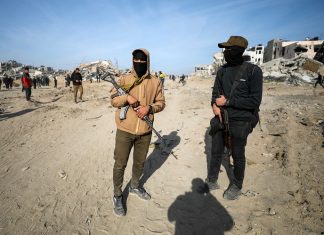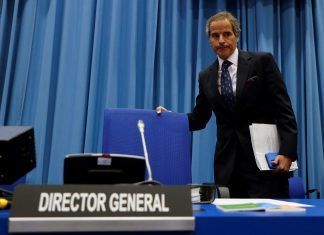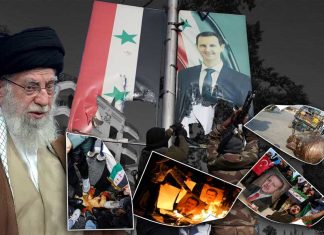By Ahmad Rafat
The London-based Iranian filmmaker Mania Akbari has shot a documentary about Elnaz Nabiyi, one of the 167 passengers who died when Islamic Revolutionary Guard Corps (IRGC) air defense units shot down Ukrainian commercial flight PS752 shortly after takeoff from Tehran on Jan. 8, 2020. “Dear Elnaz” is screening this week at the Barbican Center in London.
Nabiyi’s husband, Javad Soleimani, is the producer of “Dear Elnaz,” which has been screened at several film festivals including the Sheffield International Documentary Festival (Sheffield DocFest).
“I lived in Alberta with my wife while studying for my doctorate at the University of Alberta. My life changed completely after this crime,” Soleimani said in an interview with Kayhan Life.
“Many lives have undergone undeniable changes. We have been involved in events that we never imagined we would experience,” he said. “Many have been in therapy and taking medication. Some abandoned their studies and quit their jobs. The situation has worsened, given that we are dealing with a regime that hides the truth, and threatens and terrorizes families who seek justice for their loved ones.”
Referring to the financial compensation extended to families of the victims, Soleimani said: “We have always sought the truth, and compensation will not heal our wounds, even though all families of the victims are entitled to financial compensation. We can discuss financial compensation once we have the truth and get justice.”
Dr. Hamed Esmaeilion, the spokesperson and president of the Canada-based Association of Families of Flight PS752 Victims — who lost his wife, Parisa Eghbalian, and nine-year-old daughter Riera in the crash — voiced similar sentiments.
“We are not the survivors,” he said. “We are victims ourselves.”
On Jan. 8, two missiles hit Ukrainian commercial flight PS752 shortly after it took off from Tehran Imam Khomeini International Airport, and as it was flying over the suburban town of Shahed Shahr. All 176 people on board — the nine crew members included — were killed.
For three days after the incident, Iranian officials insisted that mechanical failure had caused the plane to crash. They eventually admitted that two IRGC missiles had downed the aircraft despite overwhelming evidence that it was not posing a threat.
Even after two years, Iran still claims that “human error” caused the crash. International investigators believe that the firing of the two missiles was a “deliberate” act and hold the Islamic Republic responsible for the death of 176 people on board.
The documentary “Dear Elnaz” is an effort to prevent this harrowing episode from being forgotten.
“The human dimension is ignored in such crimes,” Soleimani said in the Kayhan Life interview. “The primary [goal] was to keep the memory of Elnaz alive, and then investigate various aspects of this crime and finally show that this was one among many crimes the state has committed in the past 42 years.”
In May 2021, Ontario’s Superior Court of Justice ruled that the downing of Ukrainian commercial flight PS752 was “an international act of terrorism.” On Jan. 3, an Ontario court awarded $107 million (Canadian dollar, equivalent to roughly $84 million U.S. dollar), plus interest to the families of six people who died in the crash.
High-Level Officials Behind Ukraine Airliner Crash in Iran -Victims’ Report
On Jan. 3, five days before the downing of Ukrainian commercial flight PS752, the former commander of the IRGC’s Qods Force, Lieutenant General Ghasem Soleimani, and dozen others were killed in a U.S. drone attack on Baghdad International Airport.
On Jan. 8, in an operation codenamed Martyr Soleimani, Iran retaliated by launching dozens of ballistic missiles at the Ayn al-Asad airbase, housing U.S. and Iraqi troops in Al Anbar Governance. Most commercial and passenger flights are halted under such conditions. It is unclear why the Iranian authorities stopped most flights but allowed Ukrainian commercial flight PS752 to take off.
Javad Soleimani noted in the interview with Kayhan Life that there were “no clear findings in this case since the beginning. Initially, they [Iranian authorities] claimed it was a mechanical failure, but after footage emerged that exposed that lie, they admitted missile attacks had caused the crash. Subsequently, they insisted that it [the crash] was caused by ‘human error’”.
“However, they kept the black boxes [flight recorders] hostage for seven months. The Ukrainian and Canadian authorities said they received incomplete information,” Soleimani noted. “We now know that it was a deliberate missile attack, but none of the officials who committed this crime have been removed from their posts.”
“Undoubtedly, the highest authority in Iran, namely [the Supreme Leader Ayatollah] Ali Khamenei, will never undermine the IRGC by allowing the organization to be implicated in this matter,” Soleimani argued. “The only path remaining is to try the Islamic Republic in an international tribunal.”
Given that the airline was state-owned and most of the passengers who died in the crash were Canadian citizens or permanent residents, those two governments have spearheaded the investigations. They have described Iran’s incident report as “ridiculous” and argued that they had no other option but to try the case in an international court, given “Iran was insincere in its cooperation in finding the truth” about the crash.
Meanwhile, Javad Soleimani urged the International Civil Aviation Organization (ICAO) to refer the case to the International Court of Justice (CIJ) in The Hague, Netherlands.
Under ICAO’s Annex 13, “the country where the crash occurred leads the safety investigation.” However, it is unheard of that the country in charge of the investigation is accused of causing it.
Under Article 3 of the Chicago Convention on International Civil Aviation — which Iran is a signatory to — “every state must refrain from resorting to the use of weapons against civil aircraft in flight.”





